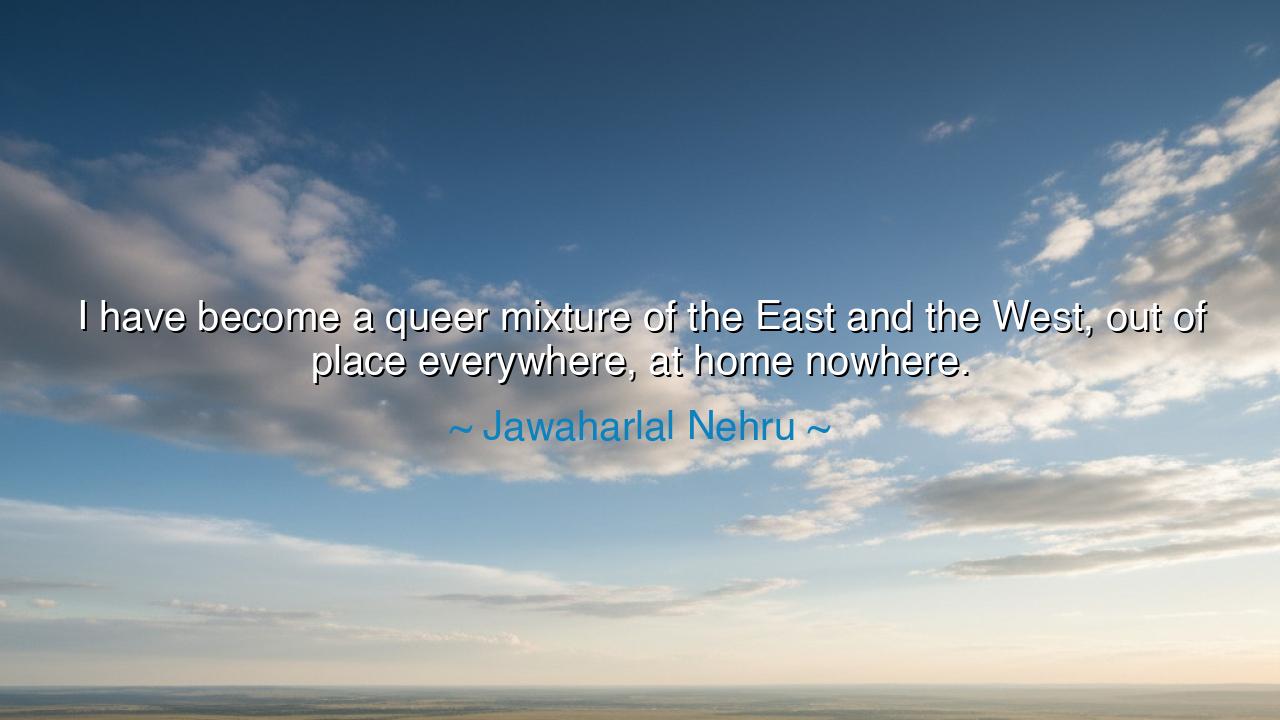
I have become a queer mixture of the East and the West, out of
I have become a queer mixture of the East and the West, out of place everywhere, at home nowhere.






The words of Jawaharlal Nehru, “I have become a queer mixture of the East and the West, out of place everywhere, at home nowhere,” rise from the heart of a man standing at the crossroads of civilizations. In this confession lies not weakness, but profound self-awareness — the recognition of a soul stretched between two worlds. Nehru, shaped by the ancient soil of India and the modern thought of Europe, felt within himself the tension of a divided inheritance. His words reveal the ache of the modern spirit, torn between tradition and progress, belonging and alienation. To understand this quote is to understand the universal struggle of identity in an age of change — when the heart clings to the past even as the mind reaches toward the future.
The origin of this quote can be traced to Nehru’s reflections in The Discovery of India, written during his imprisonment by the British in the 1940s. There, he looked inward to understand who he was — an Indian patriot, yet educated in the halls of Harrow and Cambridge, immersed in Western philosophy, science, and politics. The British had taught him to think with reason, yet his motherland taught him to feel with spirit. From this inner conflict emerged his lament: he was a bridge between East and West, yet bridges belong fully to neither shore. His sense of alienation was not personal alone; it mirrored the struggle of a colonized people — caught between reverence for their heritage and fascination with the power of the West.
In the ancient sense, Nehru’s words echo the exile’s condition — the pain of those who walk between worlds. Like Odysseus, who longed for Ithaca after years among foreign lands, Nehru yearned for a home not merely of geography but of belonging. Yet the tragedy of the exile is that in seeing many worlds, he belongs completely to none. Such is the price of expanded vision. The man who has tasted multiple truths can no longer be comforted by a single one. He becomes, as Nehru calls himself, a “mixture” — neither this nor that, but something new, unclassified and uncertain. And yet, this very “queerness” — this blending of spirit — is also the birthplace of wisdom.
For within Nehru’s sorrow lies also his greatness. His conflict gave him empathy — the ability to see both sides of humanity, to understand the hunger of the East for justice and the West’s thirst for knowledge. In being “at home nowhere,” he became at home everywhere — able to converse with kings and peasants alike, to speak the language of science and the poetry of the soul. His identity, fractured though it seemed, became the mirror of modern India — a nation rooted in ancient philosophy yet destined to walk in the modern world. Thus, what first appears as alienation becomes the crucible of renewal.
History has seen many such wanderers between worlds. Rabindranath Tagore, the great poet of Bengal, also felt the weight of this dual heritage — embracing the Western ideals of individuality and progress while remaining faithful to the Eastern vision of unity and harmony. Across the seas, T. E. Lawrence, the Englishman who became “Lawrence of Arabia,” found himself similarly torn, neither fully English nor Arab, belonging to both and to neither. Such souls, though restless, serve as bridges through which civilizations learn to speak to one another. They are the pilgrims of the human spirit, destined to wander so that others may find a way to reconcile.
Nehru’s lament is thus not a cry of defeat, but a recognition of destiny. The world itself is becoming what he once was — a mixture of East and West, of tradition and innovation, of the sacred and the rational. To be “out of place everywhere” is the fate of all who live ahead of their time. The challenge is not to seek a single home, but to create home within the heart — to make peace with the contradictions that shape us. The wise know that identity is not a fixed dwelling, but a flowing river that draws strength from every shore it touches.
So, my child of the turning ages, take this teaching to heart: do not fear the in-betweenness of your spirit. If you feel divided between cultures, languages, or beliefs, know that you are walking the path of the bridge-builders. Let the East teach you depth, and the West teach you reason. Let your many influences weave together into one tapestry — your own. For the world belongs not to those who cling to purity, but to those who embrace multiplicity.
And when you, like Nehru, feel “at home nowhere,” remember: the soul’s true home is not in a land or a culture, but in its ability to understand and unite. To live between worlds is to stand where the light of one dawn meets the fading glow of another — and in that meeting, you become the sunrise itself.






AAdministratorAdministrator
Welcome, honored guests. Please leave a comment, we will respond soon